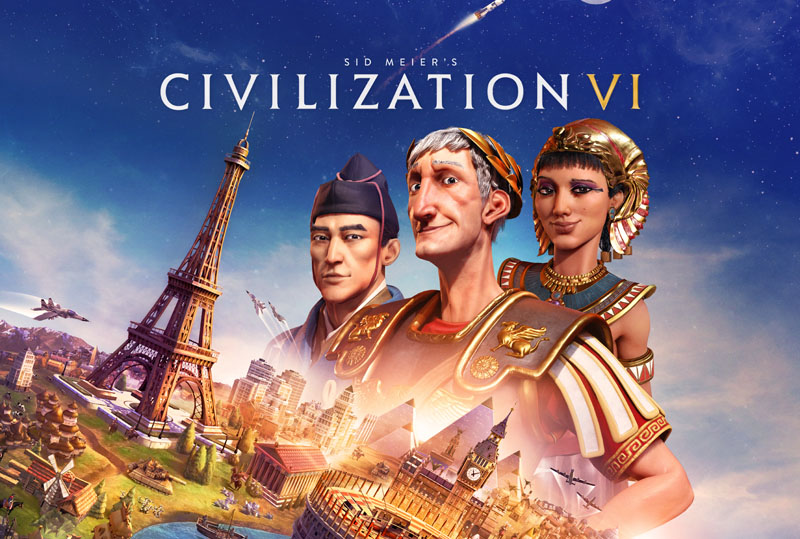
I love Civilization. It’s one of my favorite games, and it’s possibly the best 4X strategy game out there. There’s just something about the what-if driven experience of taking a historical civilization like the Romans from the stone age to landing on the moon. That’s assuming you haven’t already achieved a domination victory because the Romans have borderline-OP Ancient and Classic-era units, and if you think you can stop the onslaught of my Legionaries, you are sorely mistaken.
One of the key game design elements that makes Civilization work is its use of Abstraction. Abstraction is a fundamental concept in all games. It’s the practical application of the action taken by a player translated to the context of the game. That’s a really generic way of describing it, so here’s a specific example given by Dave Eng from University XP:
Abstractions are the “mental leaps” that designers make when creating games around certain themes. Street Fighter is a fighting game; but as a player you don’t actually fight in it. A series of moves on the directional pad (and to be honest a little button mashing) simulates the game’s hand-to-hand combat. -Dave Eng, University XP
To give another example, Dungeons & Dragons abstracts various aspects of a character with Hit points. Per the Player’s Handbook, “Hit points represent a combination of physical and mental durability, the will to live, and luck.”
Dave’s article (linked above) does a really great job of explaining Abstraction in the context of game design, so I would encourage you to check it out. Coincidentally, he briefly talks about how Civilization uses turns to abstract the passage of time, so that’s pretty cool.
Abstraction can vary greatly in its application. Civilization broadly uses Abstraction at a high level, abstracting what would be significant real-life actions into simple in-game interactions. For instance, rather than using deep systems to simulate realistic economies, Civilization tasks the player with managing abstracted resources like gold and industry. This sacrifices realism for easy approachability.
In general, Civilization strikes a great balance with its abstraction, representing complicated ideas and actions with intuitive player-driven interactions. This allows new players to quickly pick up the game and engage as deeply as they want.

There is, however, one particular system where I feel that the level of abstraction works as a detriment to the experience, and that’s with how religion works in Civilization. This is an objection rooted in my own observation of how religions have developed, and it’s an objection I wouldn’t normally bring up, but Civilization allows you to achieve a religious victory, which warrants a bit more scrutiny.
Civilization doesn’t really “get” religion.
As a quick primer, here’s how religion works in Civilization. I’m also tired of typing out Civilization, so from here on out, I’ll be referring to it as Civ, or Civ 6.
To found a religion, you need to get a Great Prophet. This allows you to pick from a number of real-life religions (Catholicism, Buddhism, Islam, etc.) in addition to custom religions that you can name.
Once your religion is founded, you can create faith-based units like Apostles and Missionaries to spread your religion to other civs and city-states. Apostles in particular can be used to reform aspects of your religion and give you bonuses.
As other civs start and develop their religions, your religious units can come into combat with theirs as you struggle to evangelize your civ’s faith. You win the game with religion by being the majority faith in every civ.
My problem with it is that it’s not very reflective of how religions develop in real life. I think a part of the problem stems from the use of real life religions, particularly ones that share the same historical legacy. Several Christian denominations are featured as pre-made religions: Catholicism, Protestantism, and Eastern Orthodoxy are all available as soon as you get a Great Prophet to establish your religion.
If you have some historical background on those denominations, you know that they have a complicated and interwoven history with each other. For simplicity, let’s just look at Protestantism. In real life, the Protestant movement came out of the reformation after Martin Luther broke with the Catholic church over a number of hot button issues that we don’t have the time to get into.
To bring it to a succinct point, Civ 6 fails to properly recognize and reflect the fundamental contexts that occur in religious history. I realize that you can make the argument that Civ doesn’t reflect how human cultures also change and evolve and amalgamate. That’s fair–America didn’t exist in the stone age, but the game allows for that historical “inaccuracy” to exist. But I’d argue that, while inaccurate, the whole concept of the game is to take your unique Civ to victory.

The problem is this:
A religious victory is kind of boring
As it currently functions, religion is practically a different flavor of combat and warfare. Frankly, it’s one that lacks the depth of Civ 6’s normal combat. It’s not a bad system, but it is a shallow one. If the game were more eager to embrace some of the complicated aspects of religious evolution, you could create some much-needed depth.
In practicality, achieving a religious victory means pumping out missionaries and apostles and sending them across the map to convert every city they come across, sometimes having to re-convert them if another religion supplants yours. While it is something else to do, it’s not particularly interesting.
I’ll add that I don’t mind some of the abstraction in place for religion. I like how you can use Apostles to “reform” aspects of your faith in the form of giving you different bonuses. That’s a neat way of weaving the idea of a reformation into an actual gameplay reaction.
But there needs to be a greater integration of gameplay mechanics than that. Achieving a science victory requires you to make it through the entire tech tree to build a rocket to space. While that is a specific goal, the tech tree gradually allows you access to new resources, buildings, and units that don’t directly connect to winning with science. Likewise, winning with culture forces you to engage with other systems and provides benefits outside of the victory conditions.
Religion, on the other hand, largely exists in a silo. As noted, there are some static bonuses, but otherwise a religious victory forces you into a pretty specific route. You have to spam Missionaries and Apostles. It’s a victory that you can largely ignore without consequence. In fact, you might have to ignore it if you don’t get a Great Prophet before the maximum number of religions have been claimed since they’re capped based on the number of players. Other victory conditions require you to be more proactive in preventing other players from achieving.
To bring it back to the subject of this post, the Abstraction here is too much. I think the developers are gun shy about how religion is implemented due to religion being a fraught topic in real life, which is unfortunate since human history is full of religious people whose faith contributed richly to how they acted in life. Religion is messy, and at times, downright ugly. But it’s inherent to humanity’s existence, just as much as our pursuit of science or our closely-held cultural proclivities.
I’ll admit that I don’t have a solution to this problem. I don’t know how to improve the religious gameplay. I just know that I want to see more dynamic gameplay that’s willing to explore how religions can shift, how they can change, how they can split, and how they fundamentally shape how humans see and interact with the world around them.
Abstraction is a great strength for Civ 6, but religion is too abstract in its current state, and with Civ 7 currently in development, I hope we see a greater willingness to dive deeper into it.
All images courtesy of Firaxis Games & 2K
If you want to hear more of my semi-coherent ramblings, be sure to sign up for my newsletter:

Nicely done! Very well thought out and intriguing line of reasoning.